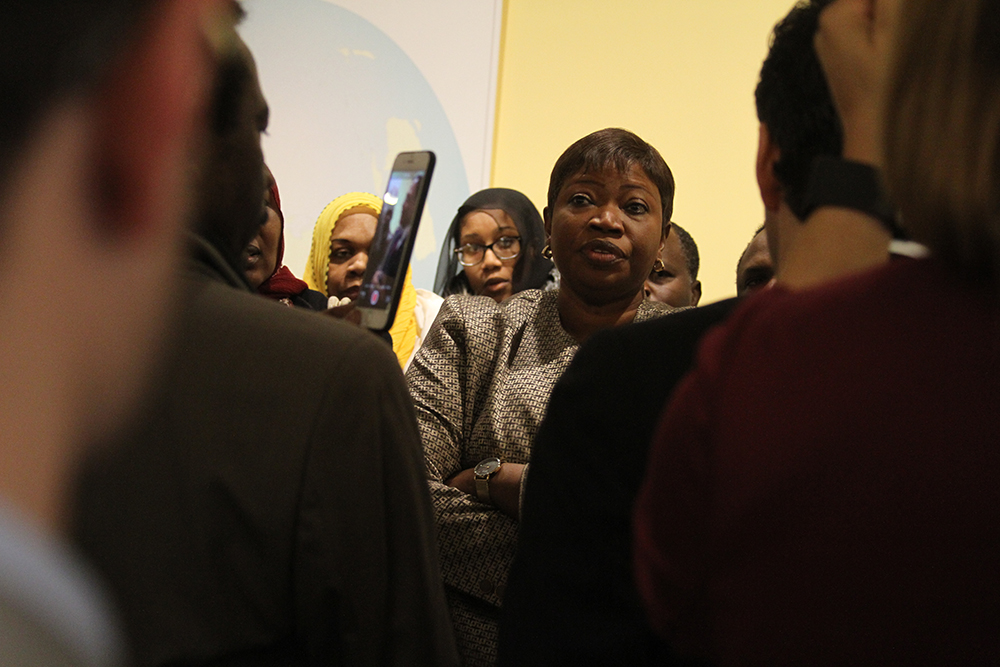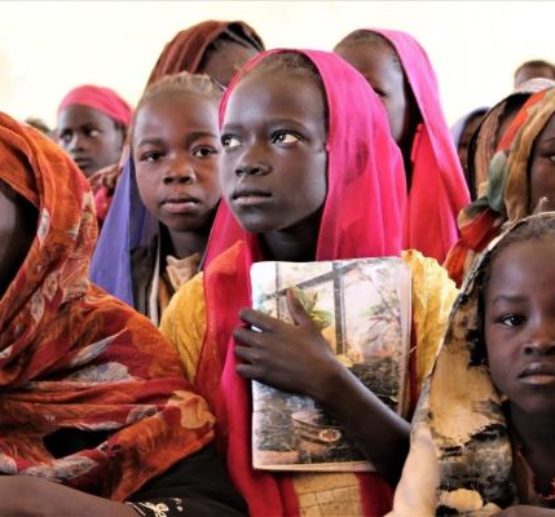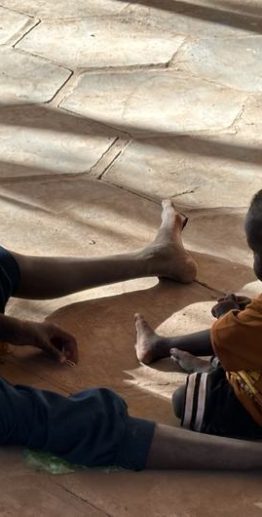ICC: We Are Not Giving Up On Darfur
DWAG President Niemat Ahmadi and team members attended the ICC prosecutor’s 24th report on the Darfur case to the United Nations Security Council. During the briefing, ICC reinforced its commitment to arrest President al-Bashir for war crimes and genocide.
Carla Ruas

“What are we to say to victims who continue to suffer in Darfur?” Gambian lawyer Fatou Bensouda, a prosecutor with the International Criminal Court (ICC), asked the United Nations Security Council (UNSC) last Tuesday, December 13. Ms. Bensouda was briefing the council for the 24th time about the the ICC’s ongoing investigation into the genocide in Darfur. And in the process, she wanted to know why they had not done more to help her office seek accountability. “Victims, including some that I have met personally, are puzzled and dismayed by the council’s lack of action,” she stated.
Ms. Bensouda’s impatience is justified. The Darfuri genocide has been ongoing for 13 years and civilians have had little relief from the dire situation inflicted by the Sudanese government. Women and girls continue to suffer rape and sexual assaults. Civilians remain in Internally Displaced People (IDP) camps far away from their homes. And men who oppose the government are summarily tortured and executed on a daily basis. “Time may lapse, but time does not erase the fact that serious crimes have been committed in Darfur,” the prosecutor stated, as members of the council and Sudanese activists in the audience listened attentively.
Since April 2016, according to Ms. Bensouda’s investigation, the situation has actually worsened in parts of Darfur. In the mountainous area Jebel Marra, hundreds of civilians have been victimized by government aerial bombardments. Also, a recent report by Amnesty International has indicated that the government may have deployed chemical weapons in the region earlier this year. At least 250 people, including children, have died due to the exposure to such chemicals. (Ms. Bensouda reassured the council that her office is investigating the allegations and working to prove the attacks, in spite of the Sudanese government’s efforts to isolate the region.)
As the situation worsens, so does the impunity for those responsible for the genocide. The ICC has issued five arrest warrants against Sudanese government officials accused of committing crimes against humanity, war crimes and genocide in Darfur. According to Ms. Bensouda, all five suspects are still at large, and three of these men continue to have a prominent position in the Sudanese government. One of them, of course, is President al-Bashir, whose arrest warrant was issued a staggering eight years ago.
The prosecutor was not afraid to criticize the ICC member states and UNSC member states for not making an effort to arrest al-Bashir as he crosses international borders unimpeded. Since March 2009, the president has traveled on 131 occasions to attend events ranging from presidential inaugurations to international sporting events. On 14 of those occasions, al-Bashir traveled to ICC member states, and in 117 to non-member states. “His movements are traceable. The world knows where he is and where he travels to, often in advance, from the media. There is ample opportunity for Mr. al-Bashir to be apprehended if the political will exists among states and this council,” she pleaded.
Ms. Bensouda reminded those present that the ICC is only a judicial pillar; therefore, it has no police power. According to the United Nation’s Rome Statute, the states must reinforce the court’s decisions. And such reinforcement is not optional. South Africa, for instance, has recently been called to explain its refusal to arrest Mr. al-Bashir during his visit to the country in June 2015. However, let us not forget that the UNSC has its own share of responsibility in this case. Lack of action from the council has no doubt encouraged many states to host President al-Bashir without fear.
After the presentation, council members were asked to give their opinions about the report.

The overwhelming majority of members (including five permanent
members China, France, Russia, the United Kingdom, and the United States) expressed an unwavering support for the court and raised extreme concern about the escalation of violence in Darfur. Some states reinforced the urgency to act by referencing the ongoing sexual violence against women and girls in Darfur, where rape is often used as a weapon of war: “Attacks on civilians and sexual violence continue and must be brought to an end. We urge parties to resort to dialogue to achieve a lasting political settlement,” said the representative from Malaysia. Others expressed concern about the use of chemical weapons by the Sudanese government. “The use of chemical weapons should push this council to act even more,” said the representative from France.
Egypt, Angola, and China’s members sided with the Sudanese government, which was no surprise for the council, the prosecutor and us.
Lastly, the government of Sudan issued their own statement on the matter, shamelessly describing the prosecutor’s report as “pointless monologue and blatant lies.” The Sudanese representative claimed that there is peace in Darfur since September 2016, when in reality, Sudan continues to attack the Nuba Mountain and Blue Nile regions, violating the referenced peace agreement. Overall, Sudan’s representative used unprofessional language and made baseless accusations to the court. The statement was undiplomatic in its tune, which shows that the Sudanese government is desperate and lack confidence.
Following the briefing, Ms. Bensouda met with the Darfuri diaspora and NGO representatives who were watching from the gallery. Everyone was very eager to speak to her and show their support. In a passionate conversation, the prosecutor assured the crowd that “in spite of the challenges, my office is committed to continuing investigating and doing whatever is possible to deliver justice to the victims.” On their end, activists (some who came from NY, Philadelphia, and Washington D.C., including our team) assured the prosecutor that they will do whatever it takes to help her office seek justice for victims.
At the end of the day, the briefing renewed the energy of council member to support the people of Darfur and the ICC. Our hope is that the council will go beyond words and actually take action to improve the situation in Darfur. On our part, as citizens, we must continue to speak up and make it clear to our leaders that justice is the only way to end the longstanding crises in Sudan. We must remind our representatives that it is their legal and moral obligation to step up. They must make it clear to al-Bashir that impunity for such heinous crimes is not an option.



